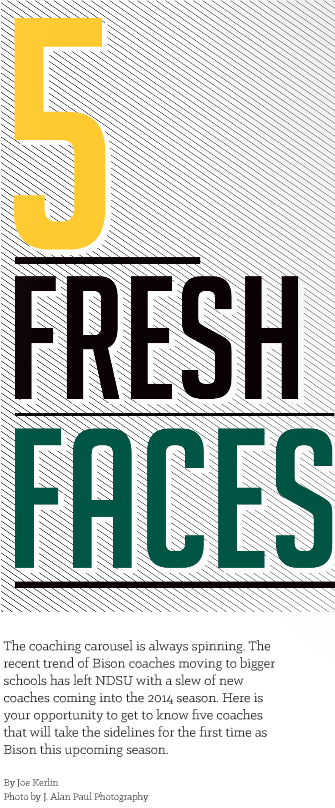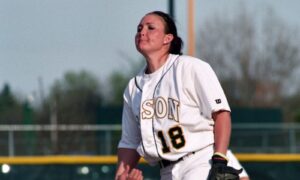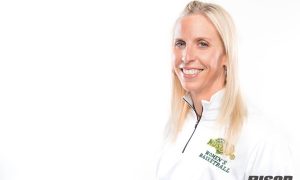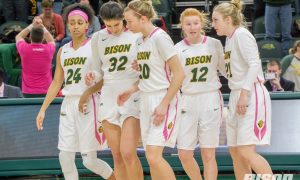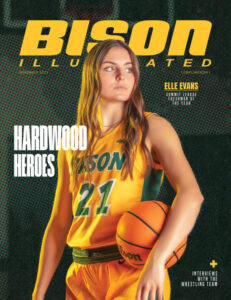Jayden Olson
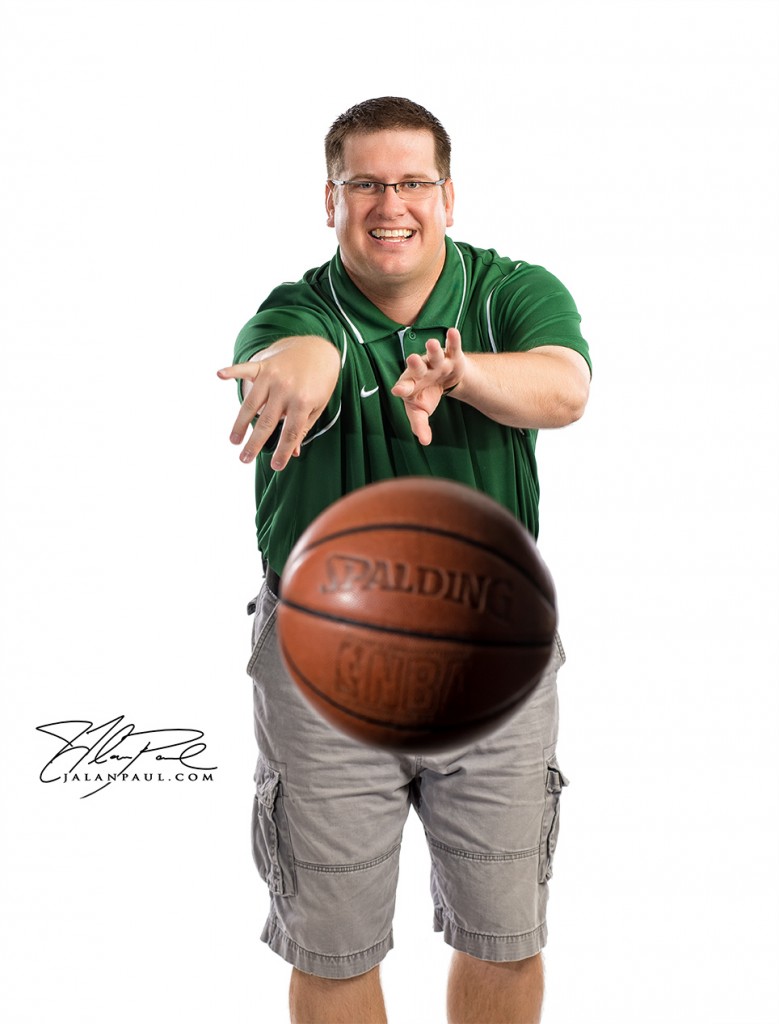
Coach Olson acted as the Director of Basketball Operations at Colorado State and Nebraska for former Bison men’s basketball coach Tim Miles.
Bison Illustrated: What’s it like getting back into the coaching after being a director of basketball operations for the past four years?
Jayden Olson: “It’s great to be back on the court. It’s something I’ve always wanted to do even when I took the job at Colorado State. My goal was to become a Division I assistant coach and now I have that opportunity. It’s been great to be back on the court, to get with the guys and do those kind of things. Recruiting and building relationships and those kind of things. You know, when you’re the director of basketball operations, you can’t have a lot of the conversations you had with people … you were in contact with. You’re dealing with a completely different network, so I have been able to get back with some people I have built some strong relationships with. It’s been exciting.”
Describe your game as a player.
“I was a bad player (laughs). I guess I would describe myself as a smart player, probably someone who over-achieved, probably more successful than what my talent should have let me be. Kinda just made the right plays, knew where the ball needed to be, found a way to score or get fouled or rebound. Hopefully I was a guy that found ways to help his team win.”
You’re from North Dakota; what’s it like to be back in your home state?
“It’s great to be back. Couldn’t be more excited. I have seen my parents more in the past three months than I did in the previous seven years so it’s been really good.”
Does it help the relationships you are trying to build that you have had experience in North Dakota as a graduate assistant at UND?
“I’m on the right side now (laughs). I think UND is where it started. I started building those relationships in the region while I was at UND and then after three years at Augustana where I really had a chance to expand my network and meet other people. Because you’re more into the game when you’re an assistant than when you’re a graduate assistant. You have more responsibility.”
Where was your first job?
“My first job was at Williston. When I was done with school, I went to Williston for two years so I was an assistant there for Coach (Terry) Olson, who I played for. He just said, help me find players, help me do this and that. He kind of created a position for me and that was just learning on the fly. I had learned from him as a player and then as a coach I really started to learn more from him.”
What kind of influence did Coach Olson have on your basketball coaching ability?
“He had a huge influence on me. My dad was my high school coach and obviously my roots were set there. Then I went on to Williston and Coach Olson was the first guy to really tell me some different things and have different philosophy. I had everything at home but he really helped plant seeds in me when he’d throw out ideas at me. He really helped open my eyes to things.”
How did the director of basketball operations at Colorado State come up?
“Well I have known Coach Miles forever. Coach Miles recruited a guy that played for my dad in the early 90s, so I was probably a 5th or 6th grader and he was around a lot. So I got to know who coach Miles was. And then he was at Mayville when I started to go to college. Then he went to Southwest where my brother went to college. We really got to know each other through Coach (David) Richman. I was working camps and Coach Richman and I developed a friendship and I would come work NDSU camps. I was just running around, working camps just trying to learn the profession. We were running a camp here and I decided to stay an extra couple of days and he’s doing a coaching clinic in Warroad and he asked me if I wanted to come with. I’m a young guy so I said of course – this is Tim Miles, I want to go with him. So I went with him and we went there and we spent 24 straight hours and really got to know each other. And he told me at one point I’m going to hire you and it happened to be the right time.”
What are some of the things you picked up on with coaching by spending so much time with Tim Miles?
“He’s definitely great. Just like everyone I have been fortunate enough to have been around and work for really good coaches – Coach Miles is just one of them. He’s a little different because he’s the best I have ever seen in the public, marketing and getting the word out about the team. You notice those kinds of things, but the reality of it is that he wins wherever he goes. He’s a really good coach and really good with the X’s and O’s, really knows the game. From an offensive standpoint, he’s as good as I have seen. He just has random ideas and thoughts he’d be putting in the day of the game and they’d work that night. I’m just like ‘Man, our guys can’t even learn them.’ He’s so charismatic, because at Nebraska – I don’t want to say the program was in a lull when we got there but it was a little – they had a lot of success in everything but basketball. If last year you would have watched it, you would’ve thought there’s been 50 years of history and tradition. He’s just really good with people and I think that goes back to relating to players and those kind of things. He really gets people to buy into him and getting to play for him and to play for what he stands for.”
I gotta ask: what happened when Coach Miles got thrown out of the first round of the NCAA Tournament?
“Well the first half we felt like we weren’t getting the whistle, which no basketball coach ever thinks he’s getting the whistle. So Coach (Craig) Smith nudges him and says ‘Hey, you need to get one, you need to get one.’ So he gets a technical and we’re like, ‘Okay that’s good.’ We started a little rally and then they forget. There was 15 seconds on the shot clock and we cut the lead to 11. Baylor has a side-out and they’re running it and they don’t run the clock. So our bench, we’re all losing our minds. So Coach raises his hands up and walks out of the coaching box. Normally, they’re like ‘Okay, why are you out of the coaching box? Relax, go back.’ But they didn’t do that. The ref T’d him up for charging him and I mean, we laugh about it now because Coach Miles has never been kicked out of a game, never done anything like that so it was kind of goofy. It was a unique situation, that’s for sure. It surprised our whole staff. We were kind of looking at each other like, ‘Are they really going to do this? Are they really going to kick him out?’ We found out eventually that they didn’t have to call it, but it wasn’t in character for him. It was just random. He’s trying to figure it out. He’s fighting for our team, we weren’t playing well, and we weren’t making any shots so we had to find any edge we could get. And that’s Coach Miles, that’s his greatest strength—the edge he has.”
What was the NCAA Tournament like for you as the director of basketball operations?
“It was awesome. I mean it was a lot of work as the director of basketball operations, but just to get there, which was awesome. To be able to feel it and to be a part of it. You always as a little kid, you’d be in basketball camp, growing up in a basketball family, you always dream about playing in the NCAA tournament and being there. Of course I never got the chance to play in a NCAA Tournament but then you get there and it’s unbelievable. Lifetime memories. You get there the first time and you’re like: ‘Wow. This is cool. This is what you dream of, you know. Oh yeah, we have to play.’”
Why did Coach Richman hire you?
“I think first and foremost I got the job because Coach Richman and I go way back. I have known him for a long time. I think we have the same goals, similar characteristics. I think we have the same personality because we get along from that standpoint. And I think he sees some areas where he can improve me and where I can add to the program.”
What kind of role do you see yourself playing with this coaching staff?
“I don’t think he’s finalized any of that with hiring a new staff and those kinda of things. I don’t think he’s made those final decisions. He feels very good about the staff that we have hired.”
Why do you think you’re ready to be a division I assistant basketball coach?
“I think I’m a high-character guy. I think I do things the right way. I think I have good recruiting capabilities and I think I’m a good coach on the court so hopefully from all those standpoints I fit. I’m a guy that cares about the kids, cares about their education and is also someone that can help them be better people along the way.”
How do you go about building relationships with some of the upper-classmen on the team?
“I think the easiest thing and the first thing you have to do is give them something. Because you know these guys have earned their scholarships, and what they have done here, they have had a lot of success before I even came here. So I think you have to give to them and go from there. I think the biggest thing is ‘sweat-equity’. You know, you’re on the court and you’re grinding it out with them and figuring out those kinds of things. They see you’re going to work, they’re going to work for you. The things is, when you walk into a situation like this and there’s guys and players here that have worked so hard and they do things the right way, it’s more that I’m trying to add and mix in with them more than change things.”
Where is the team at in regards to readiness for the season during this very moment?
“We don’t really know at this point. We’re excited to see where we are and we’re excited about the future. The goal every year is to put yourself in position to win the Summit League and get a spot in the NCAA Tournament, but for us right now, our short term goals are to get better every day. I think every year your goal is to win the Summit League. You win the regular season and you put yourself in position to do that. I think every year as a coach your goal is to win at the highest possible level you can win at. Our job is to put our guys in position to do just that. Some teams win 15 games and they overachieve and some teams win 20 games and they under-achieve. For us it’s about to get better every day.”
How much do you know about Bison Pride before coming to NDSU a few months ago?
“I hear some about it, but you know, until you get here, you don’t really know what you’re experiencing. I didn’t know how hardcore people were and how loyal the fans are and those kinds of things. Out of the 14 sports, we won nine championships this year. That’s amazing. I feel like I basically knew nothing about it and I knew through people like Coach Richman, Kemp and Saul, all those guys are good friends of mine so I knew what they would say and what they would do. But when you’re in this profession, you get so busy doing your job and your responsibilities, you never get a real feel for it until you’re here.”
Maren Walseth
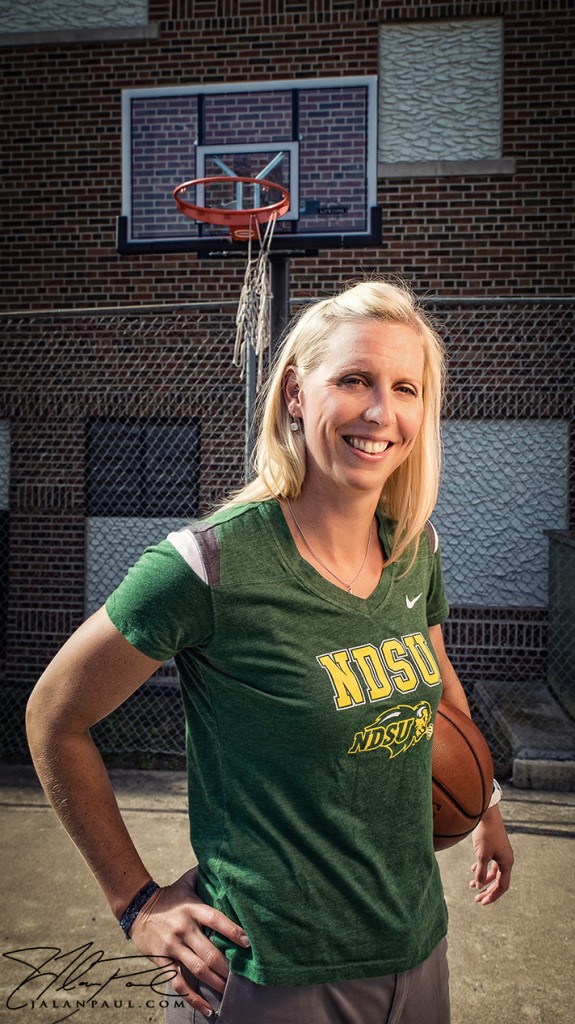
In Maren Walseth’s first season as an assistant coach at Penn State, the Lady Lions went 13-18. Her last season in 2013-14, the Lady Lions went 24-8 and advanced to the Sweet Sixteen in the NCAA Tournament.
Bison Illustrated: How’s Fargo treating you?
Maren Walseth: “It’s good. I’m adapting to the difference. I have family around here so that’s been nice.”
What’s the toughest part to get used to?
“The biggest thing is just the sheer size of the city. State College is 45,000 student and we’re just townies as we called ourselves there. This is obviously a lot larger, much larger community, many more high schools, and is a bigger community which is exciting for me. I enjoy the first class seats in and out of here. That didn’t happen at State College.”
What was this team missing last season?
“I never thought of it as missing anything. More so, a new energy is what I saw was needed. Growing up in Minneapolis, Coach Ruley recruited me, my sister played here, I’m very aware of the history and the passion the school, the department and the community has for the program. So it wasn’t like something was missing in that capacity. More so, the product was missing on the floor. More so the community the department and the school to get excited and to get behind again. If you were to say something was missing I would probably say it was missing its energy and enthusiasm more so than anything else. The enthusiasm and the passion from the community which starts with drawing from the on court product because obviously everyone wants a winner and that was something that was lacking here.”
Why is NDSU a good fit for you?
“I think it was a very good fit for me from a geographical reference. I’m a Minnesota kid, I have always thought of myself as a Minnesota kid and being able to recruit those types of kids like me when I was younger. Then to go to a place with very rich tradition of excellence on the court. There are a lot more similarities than differences in my opinion to between my experience at Penn State and NDSU. What I mean by that is both programs had a lot of success. Both programs fell on hard times. Coach Washington was named head coach and brought me on board. And rebuilding a program from there situation during some turmoil. Obviously not as many wins and what not, but eventually putting together a team that won three consecutive Big Ten championships. I think I fit in because those of those experiences; I was a good fit for this position. I mean there was the history and there was the great team, then there weren’t very many wins to build a program again and I have been through those situations, where to other people perhaps scary, but to me it was comforting. I have walked down this path the past seven years at Penn State. I know how to do this. Obviously, there are things that are very different, don’t get me wrong. The lack of wins last year and what not don’t intimidate me. They don’t scare me because I have walked into that situation before and have been a part of a rebuilding. I feel like I have some experience in that, if not the full experience, and I can always reach out to those people that have had that experience to help me along.”
How are you going to use your experience at Penn State to help you at NDSU?
“My experience with Cocques, she gave us – all of her assistant’s – a lot of responsibilities. So she prepared me as did the university prepare me for this opportunity, because I had my hands in a lot of things. I was in a lot of meeting and at the end of the day she made all the decisions, but I took in a lot of the conversations and what was going onto prepare me the best I can. You can’t be fully prepared because I’ve never done it but to prepare me the best they could for this situation and some of that is that tactical stuff and some of that are the relationships. It’s recruiting, managing your staff, managing your locker room after a win or a loss. There was a lot from her and how she ran and built the Penn State program that I’d be silly not to draw upon because it was successful and I walked in that success.”
When does the relationship-building process begin with your new players?
“It started right off the bat. My first day I got here at 7:30 at night, because I had some flight issues, but I went right to dinner with them. Building relationships with them and recruiting them first. They came here with a different vision and a different coach and what not, it’s not their fault it’s no longer in place. It would be an error on my part to not try and get to know them or not try to recruit them. I’m certainly going to have a level of expectation and push the envelope by getting the most out of them and they won’t respond unless they know I care about them. That’s where the relationship and building trust starts. That’s not one conversation or over the case of a month. It’s a constant evolution of most kids getting to know their head coach through the recruiting process and we’re sort of doing it on speed here. But it’s the most important thing in my opinion because when’s there’s trust and a solid relationship with not only me but with the staff and the staff with all the players, then we can, when we’re in tight situation, when there’s adversity, we can come together and know that we are asking them to do something, because I’m not trying to get on them, but because I have their best interest at heart and that’s an ongoing process. Talking to a couple girls that have internships over at Sanford; talking to them about what they won’t to do after, how it helps them professionally after basketball. Our staff just doesn’t care about basketball and school, we care about them. ‘Tell me about Canada, Wiebs (Brittany Wiebe). I’m ashamed to say I have never really been there.’ We have kids from Australia, I want to talk about that and get to know that. Because rough moments will come and they have to know that we trust them and it’s a constant relationship that is building.”
Kachine Alexander
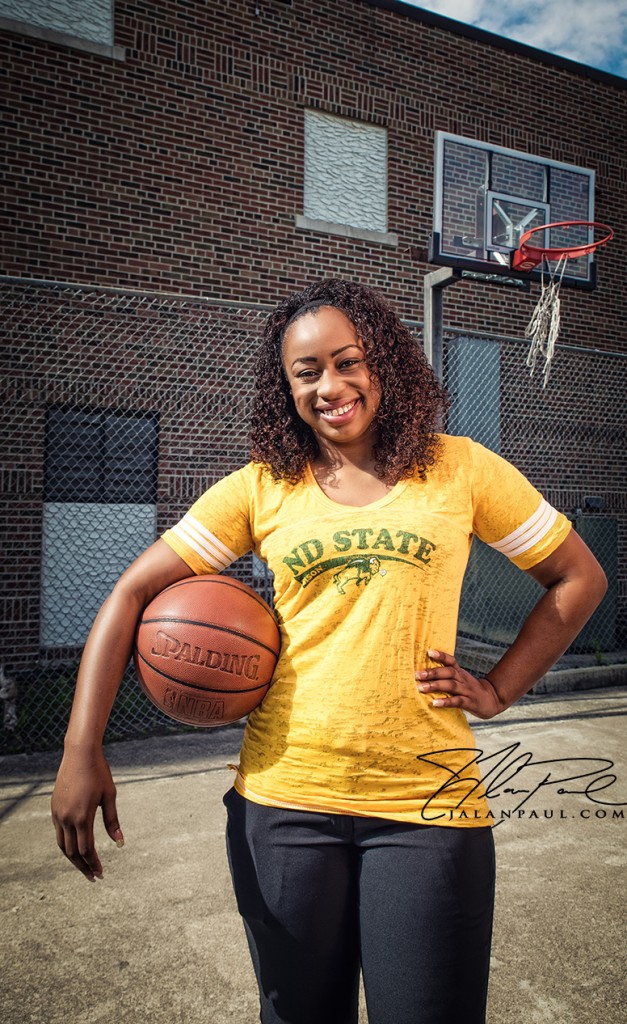
Kachine Alexander’s first visit to Fargo came when she was in 9th Grade. Alexander was here for one of the many basketball camps put on by the men’s and women’s basketball programs.
Bison Illustrated: Why did Coach Walseth hire you?
Kachine Alexander: “Maren was coaching at Penn State when I was playing at Iowa, so I think she knew the passion I had for basketball and when I’m on the court, in general. I’m kind of a firecracker. I brought a lot of energy onto the court. My other coach at Concordia pretty much said the same thing. I have a very good basketball mind for my age, especially; and I can relate to the kids more because I am younger. I think all those intangibles worked for this area and this situation; especially for recruiting and things like that.”
Would you say you coach the same way you played?
“Spitting image, mirror to mirror.”
How so?
“I was a guard. I was very high energy all the time, high-motor and never gave up on any play. I’m kind of the same as a coach because I still have a high motor on the bench, because you might see me during the games on the bench yelling and screaming, cheering, fist pumping whatever to get my girls going. You have to make them feel the moment in that particular time. So I think that’s mirror to mirror. Also, I was a defensive player in the Big Ten when I was in college and now I’m actually the defensive coordinator here. I think those two are hand in hand. I have a special place in my heart for defense.”
How have the players responded to your style of coaching?
“I think they enjoy it. I think they were kind of nervous at first because they were like: ‘oh, okay, this is different.’ I think they are feeding off it. You see them in the weight room and they are cheering each other on, they’re singing, they are interacting with a high motor with each other, they get on each other and cheer loud and things like that. I think they’re feeding into it. I think they like it so I’m excited to see how far they come out of their shell because the thing about me having a high motor and being energetic is being vulnerable at time. You say whatever, just going out there and doing whatever for your team so I think that once they let down that wall of ‘oh, I might sound weird or I’m doing too much,’ then we’ll get to that point where they’re going all out yelling and screaming off the bench. And then the fans feed off of that, and we will feed off the fans.”
When did you know you wanted to be a coach?
“In college, my coach Lisa Bluder queued me in on it a little bit. She asked me if I was going to be a coach later and I was like ‘well, I don’t know.’ I’d always remember things from freshman year. She’d (Bluder) come up to me and ask ‘hey, what was that play called from two years ago?’ Whatever it happened to be she’d come up and ask about every position and just in general. I have probably over 300 scouting reports at home just from college. I just started feeding more into not just basketball as a player, but basketball as a game. Kind of like a gameplan. Then after my first year overseas, Paul Fessler at Concordia called me and I was like: ‘Mhm, well let’s try it. If it doesn’t work, I don’t like it, I can always go back overseas.’ But as you can tell, I’m still coaching. It was the right decision. I enjoy watching the growth of the players as they get older. And seeing the impact on their life just for the four years and further. Just that in of itself is rewarding.”
How have you grown as a coach?
“Since the first year, I would say approaching different players. A player that has a high-motor a player that is very quiet. Just interacting with different players and different personalities and getting through to them in different ways. I think that has been a definite growth spot for me. Every player reacts to every situation differently. I could scream ‘let’s go!’ and some player would be like: ‘oh my god,’ so I think that knowing your kids and knowing what get them going. That’s something I have enjoyed and being a fun responsibility.”
You played overseas.
“Austria. Vienna. We went to Vienna Austria as a part of our stop we went to a couple different places and that was my first time out of the country with Iowa. My first time in Europe was with Iowa.”
What are your expectations of this team this year?
“I can’t say I have complete expectations yet, but what I can say is that we need to grow every game, regardless of whatever. We need to get better every day, whether it’s winning the rebounding battle, steals or whatever, we’ll have our goals as far as what we need. We obviously need to improve from last year. We want to improve our urgency, fast breaks things like that. We’re going to change our whole offensive gameplan and our defensive gameplan. We want the girls to be comfortable. I feel like last year they were in games a lot and then they would lose it. And all that goes back to trusting your teammates and having that winning mentality. If I go into a play saying I have a shot but Holly’s (Johnson) open, you have to trust to pass the ball and know Holly’s got it. It come with time and comes with trusting coaches, the players and the system. It all comes back to trust. I believe that once we get to that point, we’ll be a force to be reckoned with because we can score. Scoring isn’t a problem for us. I think that next year is growing every game and feeling the growth, gaining confidence with each game and towards the end of the season, you gotta see what happens.”
Andrew Carlson
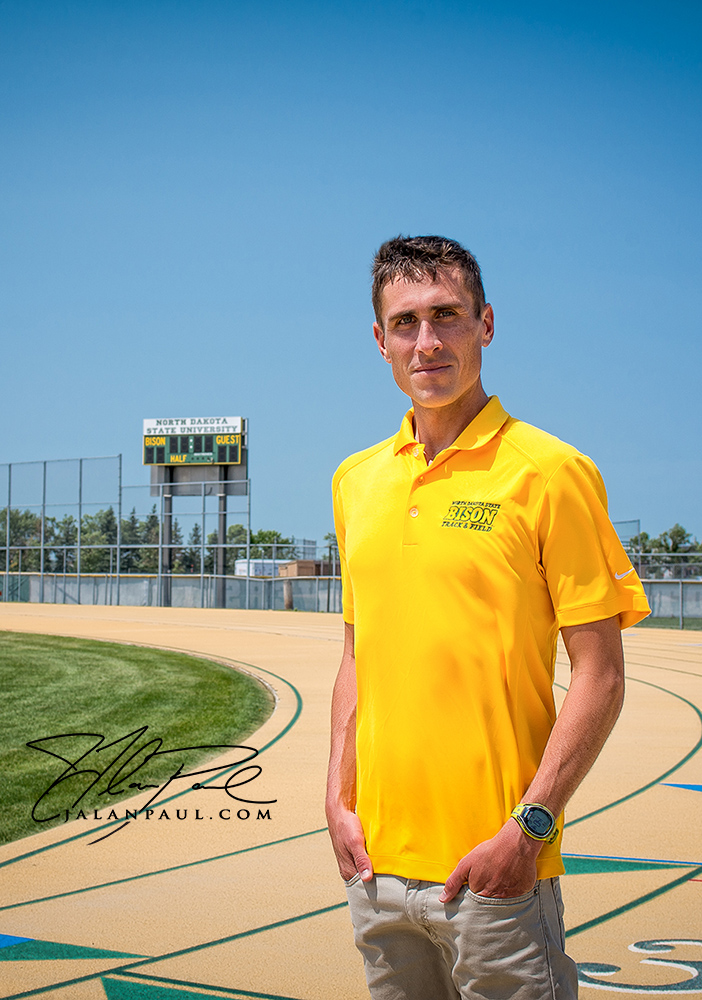
Andrew Carlson and his dog, Rocket, were featured in “Bark” magazine while Carlson was training in Arizona.
Bison Illustrated: When did you officially start coaching?
Andrew Carlson: “I started in January. I wasn’t too close to NDSU track and field, but I have been in the sport since I was 13, I have a lot of experience as an athlete and working with great coaches. It’s been a nice transition into the coaching realm.”
Was it always your goal to comeback to Fargo?
“My goal has been to coach collegiately someday. And it was always a dream to come to North Dakota State even though I didn’t quite know what it would be as. To have this be the first job I have ever had coaching, I would say I’m pretty lucky.”
What are you trying to instill in this team?
“I know for me, it wasn’t ‘hey, I won a cross country title in high school,’ because I certainly wasn’t a blue chip. I feel like I can relate to the kids that have a lot of talent and kids that feel like they don’t. I think I can see it from a lot of different angles. And the thing about the sport we’re in is if you work your butt off, you get results. It’s not always the person with the most talent comes out ahead that’s something that defines my career. As an athlete, I was all about outworking people and trying to embark that on to the team.”
Is there any way that the women’s track and field success could rub off on the men’s team?
“Yeah. It’s a culture. It’s an attitude that running and track and field in theory – besides relays – is an individual sport. It’s just you out there, but that doesn’t mean you aren’t effected by the people around you and I think that just having the women set the bar so high is going to reflect on everyone when they complete. I can tell you athletes see that and ask how do I get there? It reestablishes the standard and that happened to me in my own running career. I’d get to a level that I thought I would never get to, then I would think ‘what’s next?’ You don’t have a lot of time to be satisfied about where you’re at. It’s always: let’s see where I can go next. I think the women have set that bar really high.”
How is goal-setting vital to the progress runner’s make over their careers?
“I remember my goal coming into college was to be an All-American. The one thing I learned pretty quick was from where I was at to All-American was a big gap, so I had to set smaller goals to get me to build the steps to get there. Here at NDSU this isn’t just an overnight success. This is years upon years of building, building and building; and now you can see where it’s at.”
Is monitoring training the best way to gauge the ability of your athlete?
“It absolutely is. I mean the training give you a clear look at the fitness of your athlete. You do workout that are a barometer of how good you are. If a guy can go out and do this workout then you can say ‘hey, I think you’re in shape to do this.’ The biggest thing in running is to look at where you’re at right now. So let’s say I have a guy that wants to beak 14:40 in the 5K, well maybe he’s in 15:10 shape right now, so how do I get there? Not just wanting to be there, it’s about how we build a workout program to get you there.”
How has running professionally helped you as a coach?
“I ran professionally for nine years, from ‘05-‘14. You gotta really want to do it. The incentive financially for me couldn’t have possibly been a factor because if it was, I probably would’ve quit right away. It was certainly a trying-to-make-it-through type of thing. At the same time, it was exactly what I wanted to be doing, so the prevailing thought was always what I can do to get better. That’s been one of the main focuses of my life since I was 13. So I’m not just going on five years of doing this, I’m at 19 years now of having this passion. It’s just a part of my life and I like it more now than I did the past few years because I’m seeing it from a new angle. I can see the passion coming out of the athletes that I was so focused on myself and I can now see it through them.”
What are some of the “tricks of the trade” you picked up while running professionally?
“What I’m trying to bring out of them is the pure competitive part of the sport because that’s a real thing. We go into a lot of the races and we say: ‘hey, I think you can run this time blah, blah,’ but a lot of the time, it’s ‘see how many people you can beat. Don’t worry so much about the end outcome, like for time, just try to beat someone’ I think the people that are having the most success that I know are just competitive people that want to finish higher than whoever. If it’s first? That’s ideal. But if you can’t be first, be second, if you can’t be second let’s be third, let’s beat people, and I have been trying to get that through and we definitely have some competitive people walking around campus and it’s fun to see them compete because it’s what I like and the part of the sport I like the most is the competition.”
Who are you looking to lead your cross country team this season?
“We are really senior driven, I think we have five seniors on our roster, four being 5th year seniors. I think they’re at the point now where it’s ‘let’s have a big year, this is our chance to put a stamp on the program.’ They’re great leaders and they’re driven and focused.”
How many marathons have you ran?
“Two. I just ran the Olympic trial marathon and the Houston marathon.”
How has the running community grown since you have been away from Fargo?
“I think with the emergence of the Fargo Marathon there are more in Fargo (runners) than I feel there were. It’s strong here and people are passionate about fitness. I like how the Fargo community gets passionate about things – like the Bison – you can really feel the support from the community and that’s where I’d like to see us do really well so we can get going and I think it would really help the Fargo running community. Track is already there and I would love to see cross country there. Because you see these girls run against Texas and Baylor and Texas AM, Oregon. It’s the real deal, the top tier, just to be a part of that is a huge accomplishment.”
What’s it like being a part of NDSU?
“It’s different because the Bison are such a major part of the culture in Fargo and you can definitely feel that. It’s for good reason that ESPN had such a great success here with College GameDay. The people are really into it. I wasn’t a Bison collegiately, but I followed the Bison as a kid growing up and it’s been really cool to see how much it has grown. I use to go to football games as Dacotah Field, and I went to the first playoff game against Furman, I remember walking over and it was so cold. And I was thinking to myself, ‘I can’t imagine if this was at Dacotah Field,’ because 20 years earlier that would’ve been the case and I would’ve been walking to the game with my dad and it would have been so cold. Even that, the way the FargoDome is such a great environment to play football and I just look at it and it’s the Bison. In Fargo, I feel like as a resident it feels like our team. If you’re going to a softball, basketball, track, soccer you’re going to watch our team, not just a team you like.”
Randy Hedberg coming soon…


